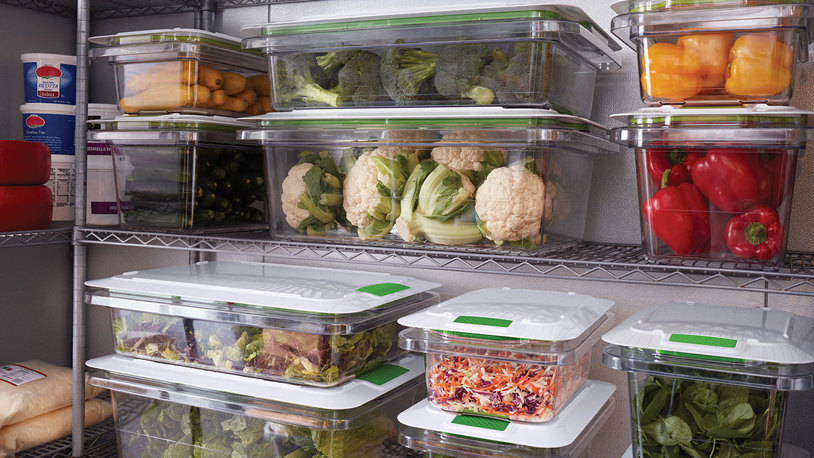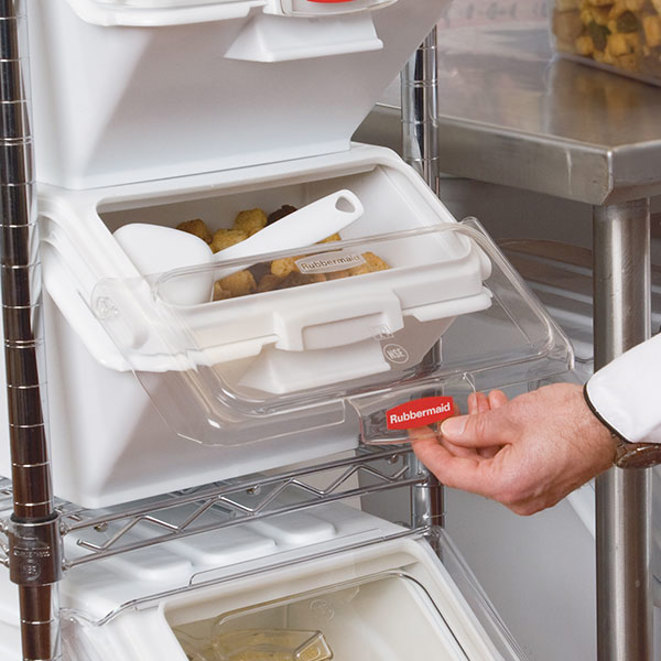
Food safety and hygiene are non-negotiable across schools, aged care, healthcare, and hospitality. Managing large volumes of meals while protecting freshness, reducing waste, and meeting high standards requires fit-for-purpose solutions. Rubbermaid Commercial provides a trusted range of commercial food storage and transport containers designed for busy kitchens and demanding service environments.
From maximising shelf space in pantries to maintaining food fresh during delivery, our products support quality service while helping facilities meet industry expectations. This guide explores practical solutions to common challenges and highlights why investing in durable storage and transport systems contributes to safer, more efficient operations.

Commercial kitchens must follow strict food safety practices to protect customers and reduce waste. Storing food correctly helps maintain freshness, prevents contamination, and supports compliance with Australian food safety standards. Rubbermaid’s commercial food storage containers are designed to keep food safe while helping facilities organise stock and maximise shelf space effectively.
Key guidelines include:
Keep food clean and separate. Use designated storage containers for raw and cooked food to avoid contamination.
Cook and reheat thoroughly. Poultry, mince, and offal should be cooked to at least 75°C.
Control temperature. Keep perishable food out of the danger zone (5°C–60°C). Refrigerate quickly, keep hot food above 60°C, and use cold storage boxes for transport.
Rotate stock. Use date panels and FIFO (first in, first out) systems to track ingredients and reduce food waste.
Safe Food Storage Temperatures
|
Food Type |
Safe Storage / Cooking Temperature |
Notes |
|
Refrigerated food |
5°C or colder |
Store perishable food immediately to protect freshness. |
|
Frozen food |
–18°C or colder |
Thaw in the fridge or microwave, never at room temperature. |
|
Cooked hot food (holding/serving) |
Above 60°C |
Keep piping hot until served. |
|
Poultry (whole, mince, roast) |
75°C in the centre |
FSANZ guideline for safe cooking. |
|
Minced/rolled meats, sausages |
75°C in the centre |
Applies to beef, lamb, pork, kangaroo. |
|
Leftovers |
Refrigerate within 2 hours; eat within 2–3 days |
Discard if left at room temp for more than 4 hours. |
Strong storage practices not only protect against contamination but also improve kitchen workflow and uphold the trust of those you serve. Using durable, NSF-certified containers ensures food safety and compliance with industry standards, while maximising shelf space and maintaining freshness.
Every facility faces unique challenges when it comes to food safety, hygiene, and efficiency. Schools must deliver large volumes of meals to students, aged care homes require support for special diets and mobility, hospitals follow strict infection control, and hospitality venues focus on presentation and freshness at scale.
We provide commercial food storage and transport containers designed to meet these varied demands. From maximising shelf space in kitchens to keeping food fresh during delivery, our solutions help facilities reduce waste, maintain quality, and deliver safe meals that meet industry expectations.
In most schools, meal service starts long before the first bell. Kitchens receive deliveries of dry goods, fresh produce, and frozen items that need to be stored safely until use. Without proper food storage containers, supplies can spoil quickly or risk cross-contamination. Rubbermaid’s NSF-certified food containers and ingredient bins provide a hygienic, organised way to store bulk flour, cereals, and snacks, making it easier for staff to access what they need during the breakfast or lunch rush.
As cooks prepare large batches of meals, colour-coded lids and storage systems help staff separate allergens such as nuts or dairy. This simple step is critical in avoiding mistakes when preparing food for children with allergies. In addition, clear containers allow staff to check stock levels at a quick view, saving time during busy service hours.
When it’s time to deliver meals across multiple classrooms or to a central dining hall, ProServe® food carriers keep hot dishes at safe serving temperatures and protect cold items from spoiling. Staff can carry and deliver food efficiently without worrying about spills or food safety risks. In shared dining spaces, Sturdy Chair™ Youth Seating with built-in Microban® technology provides a safer and more hygienic environment for younger students.
Best Practices for School Food Storage and DeliveryPlan for volume. Use stackable food storage containers to maximise shelf space in crowded school pantries and cool rooms.
Support allergy management. Colour-coded lids and storage labels protect students with dietary restrictions.
Focus on temperature control. ProServe® carriers keep hot food above 60°C and cold items under 5°C during delivery.
Organise dry goods. Ingredient bins with scoops make it easy to portion cereals, flour, and snacks while reducing waste.
Protect hygiene in dining areas. Chairs and equipment with antimicrobial protection contribute to safer mealtimes.

Mealtimes in aged care often stretch beyond the kitchen. Residents may eat in shared dining areas, lounges, or in their rooms, which means every dish must travel safely without losing freshness or temperature. Staff also need clear systems to track special diets, portion sizes, and food preferences — a challenge when multiple services are running every day.
This is where reliable kitchen storage and transport solutions make the difference. ProServe® commercial food transport containers help meals arrive hot and appealing, while cold options protect items like desserts and salads. Food storage containers with date panels give carers the detail they need to confirm resident diets at a glance, cutting down on mistakes. For dry goods, spices, and tools, durable plastic bins and ingredient containers create a convenient setup that saves both time and money.
To make service more efficient, food carts allow teams to cover more ground and deliver several meals at once. Their capacity and durability reduce the physical strain on staff while maintaining a consistent, welcoming atmosphere for residents. Together, these solutions support safe catering while enhancing the overall kitchen experience in aged care facilities.
Improving Food Storage and Delivery in Aged CareAccount for special diets. Use labelled food storage containers to track resident meals and avoid errors.
Keep meals safe during transport. Commercial food transport containers protect temperature and reduce waste during delivery.
Organise pantry items. Ingredient bins and plastic storage make it easier to access staples like flour, spices, and cereals.
Reduce staff strain. Utility carts with high capacity allow convenient delivery to multiple rooms in one trip.
Create a welcoming service. Durable, hygienic equipment supports both resident comfort and staff efficiency.
Hospitals run some of the most complex food services, preparing hundreds of patient meals daily while meeting strict HACCP standards. Each tray must reflect specific diets, textures, and portion sizes, and infection control is always a priority. Without structured kitchen storage, cross-contamination risks and food waste can quickly increase.
Rubbermaid Commercial supports healthcare facilities with solutions built for hygiene and efficiency. Cold storage boxes protect temperature-sensitive meals and reduce the chance of food falling into the danger zone. Colour-coded food prep boards keep raw and ready-to-eat food separate, helping teams manage contamination risks. For environments where cleaning detail matters, bleach-safe prep tools offer durability and convenience. Finally, tray delivery carts streamline meal service across wards, giving staff the capacity to transport multiple trays safely while maintaining food fresh and appealing for patients.
Maintaining Food Safety in HospitalsTemperature control is critical. Cold storage boxes protect meals in transit and reduce spoilage, ensuring food remains at safe temperatures to maintain freshness and prevent bacterial growth.
Colour-coding reduces mistakes. Prep boards and containers keep allergens and raw food separate, minimising the risk of cross-contamination and supporting strict dietary requirements.
Durability supports hygiene. Bleach-safe tools withstand harsh cleaning routines in healthcare kitchens, maintaining high standards of cleanliness and prolonging the lifespan of essential equipment.
Tray delivery keeps service efficient. Purpose-built carts allow convenient delivery across multiple wards, enabling staff to transport numerous meals safely and swiftly.
In hospitality, food must not only be safe but also look its best. Chefs and catering teams often work against the clock, preparing large volumes of meals for events, buffets, or daily restaurant service. Back-of-house staff need reliable kitchen storage to keep ingredients organised, while front-of-house teams depend on food transport containers that protect presentation during delivery. Without the right systems, food waste increases and service can fall short of customer expectations.
Rubbermaid Commercial offers solutions designed for busy hospitality environments. ProServe® catering carriers protect hot dishes and keep cold items fresh during off-site events. Clear food storage containers provide quick visibility of ingredients, supporting faster prep and menu accuracy.
Ingredient bins with FIFO dispensers allow teams to rotate stock effectively, cutting costs and reducing waste. For bulk kitchen storage, heavy-duty bins and shelving systems offer durability and capacity, helping teams cover every service with confidence. Together, these products contribute to smoother operations and a welcoming atmosphere for guests.
Smarter Food Storage for Hospitality KitchensVisibility speeds prep. Clear food storage containers allow staff to identify ingredients quickly.
Protect food quality. ProServe® catering carriers keep food fresh during delivery to banquets or offsite events.
Rotate stock with ease. FIFO dispensers prevent waste and keep ingredients in line with menu demand.
Organise the back of house. Heavy-duty bins and shelving create convenient, durable storage for large-capacity kitchens.
Support guest expectations. Reliable storage and transport systems contribute to consistent quality and service.
Behind every smooth food service is a well-organised back-of-house. Schools, hospitals, aged care facilities, and restaurants all depend on kitchen storage systems that keep supplies secure and easy to access. Without proper organisation, food waste builds up, stock rotation is harder to manage, and staff lose valuable time searching for ingredients and tools.
Rubbermaid Commercial provides material handling and storage solutions designed for convenience and durability. Wall racks and mobile shelving units help maximise shelf space, while heavy-duty storage containers protect dry goods such as grains, flour, and spices.
Ingredient bins with scoops make it easier to portion bulk items, while mobile carts provide the capacity to move supplies where they’re needed. Each product is designed to reduce clutter, protect food quality, and support safer, more efficient kitchens across industries.
Organising Back-of-House StorageMaximise shelf space. Stackable containers and mobile shelving create order in busy storerooms.
Protect dry goods. Durable plastic bins cover and store bulk items safely.
Make stock rotation easy. Date panels and FIFO systems reduce food waste and keep account of supplies.
Support workflow. Mobile carts and trolleys move ingredients, spices, and tools quickly between prep and service areas.
Improve kitchen experience. Organised storage contributes to safety, efficiency, and a more productive team.
Rubbermaid Commercial products are designed to help facilities protect food quality while reducing unnecessary waste. ProServe® commercial food transport containers keep meals at safe serving temperatures, preserving freshness during delivery. Cold storage boxes protect perishable items, while clear food storage containers give staff a quick view of stock levels. This makes it easier to confirm supplies and rotate ingredients effectively.
In busy kitchens, ingredient bins with FIFO dispensers support better management of bulk goods such as flour, cereals, and spices. These systems facilitate stock rotation and reduce costs by minimising food waste. To keep operations running smoothly, facilities rely on durable storage that combines capacity with convenience — whether it’s containers that stack neatly to maximise shelf space or mobile carts that move supplies efficiently from prep areas to service.
Food storage and transport shape how meals are served, how waste is reduced, and how quality is maintained for every customer. With the right systems in place, schools, aged care homes, hospitals, and hospitality venues can run kitchens that are safer, more organised, and better prepared for daily service. Investing in durable, commercial food storage and transport solutions is an investment in efficiency and confidence.
Take the next step toward smarter food service. Explore Rubbermaid Commercial’s full Food Service Collection and discover solutions designed to support safety, durability, and long-term performance.